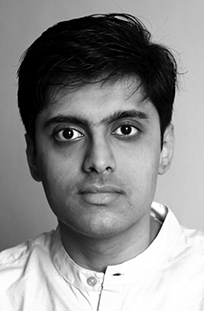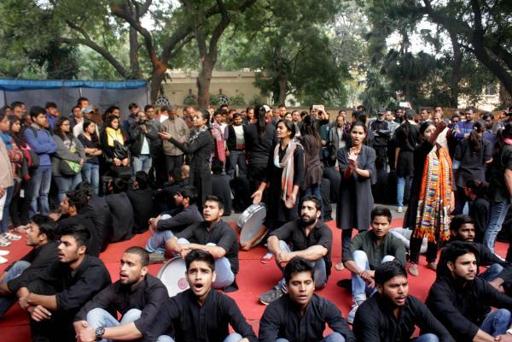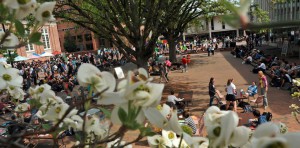 Actor Rishan Dhamija, hailing from New Delhi, India, is used to the stage, but he isn’t so used to the audience. “That’s what was surprising when I came here,” he says. He took one look at the audience and thought to himself, “‘Man! Young people don’t go?!’ Those are the only people that go and watch the theatre in India. Period.” Rishan is a first-year graduate student in UNC Chapel Hill’s Professional Actor Training Program and you can currently see him as David Lund in PlayMakers’ production of The May Queen. It’s his first professional credit. “We have professional theatre companies,” says Rishan, “but unlike a company here—like PlayMakers or La Jolla Playhouse—theatre companies back home don’t operate with budgets and permanent infrastructure anywhere close to what I’ve seen here.” In America, most actors try to make it in Los Angeles or New York, but can still find regular work in large metro areas, like here in the Triangle. In India, it’s Mumbai or nothing.
Actor Rishan Dhamija, hailing from New Delhi, India, is used to the stage, but he isn’t so used to the audience. “That’s what was surprising when I came here,” he says. He took one look at the audience and thought to himself, “‘Man! Young people don’t go?!’ Those are the only people that go and watch the theatre in India. Period.” Rishan is a first-year graduate student in UNC Chapel Hill’s Professional Actor Training Program and you can currently see him as David Lund in PlayMakers’ production of The May Queen. It’s his first professional credit. “We have professional theatre companies,” says Rishan, “but unlike a company here—like PlayMakers or La Jolla Playhouse—theatre companies back home don’t operate with budgets and permanent infrastructure anywhere close to what I’ve seen here.” In America, most actors try to make it in Los Angeles or New York, but can still find regular work in large metro areas, like here in the Triangle. In India, it’s Mumbai or nothing.
Student Origins
So in a country without a widespread professional industry, how does theatre thrive among the younger population?
“The culture starts from undergrad. At university, each college—school of economics, school of business, whatever—has its own dramatic society, which is like a little group of 50-60 oddballs who get together and make plays every year.”
Each dramatic society spends 2-3 months writing and rehearsing two plays to run all year. The university then holds an annual Theatre Fest, where the various dramatic societies compete against each other. These competitions are so fierce that they attract stars from Bollywood to judge and give feedback.
Artistic Freedom
Politics and free speech become another aspect of these drama societies. The Indian government heavily censors all film and TV, but theatre flies right under the radar. As a result, many of these student-run dramatic societies split their time between the artistic freedom of stage productions and the political commentary of street theatre. Before mass communication came to India, these loud, melodramatic, and often acrobatic performances were the only way to publicly comment on socio-political issues. “A band of people would dress up and with a mixture of music and theatre and comedy, they would go into a residential area or marketplace or subway platform and then, like a flash mob, they would put up a 20-minute play,” Rishan says. “They would do it and run.”

Not So Set In Stone
The most enthusiastic students graduate with their business degrees and go on to establish fly-by-night theatre companies. They script their own plays perform them one weekend at a time, bankrolled by parents and friends. This fills Indian theatre with a vivacity that Rishan thinks American theatre can often lack. He worries that here “everything is so set in stone.” In America, we tend to approach a classic text through a contemporary directorial concept, as we saw this season in Desdemona Chiang’s take on The Crucible. In India, they prefer to change the text itself. “Rather than basing it on the Salem Witch Trials,” Rishan says, “we would base it on Islamophobia, which is more contemporary and more directly relatable to people.”
Theatre has become a way for the younger generation of Indians to take on the issues of the day and connect with one another through art. That’s where Rishan thinks UNC provides a great opportunity for PlayMakers to expand its influence. “The Pit is an amazing place for street theatre,” he says. “At lunchtime it’s full of people and you get fraternities doing all sorts of crazy stuff. Why not theatre? Get the cast of Twelfth Night, have them run out half-costumed and do a quick scene, then run off. There’s all sorts of stuff you can do.”
“At lunchtime it’s full of people and you get fraternities doing all sorts of crazy stuff. Why not theatre? Get the cast of Twelfth Night, have them run out half-costumed and do a quick scene, then run off. There’s all sorts of stuff you can do.”
See Rishan Dhamija in his hilarious turn as The May Queen‘s David Lund, on stage through December 11. Click here for tickets.